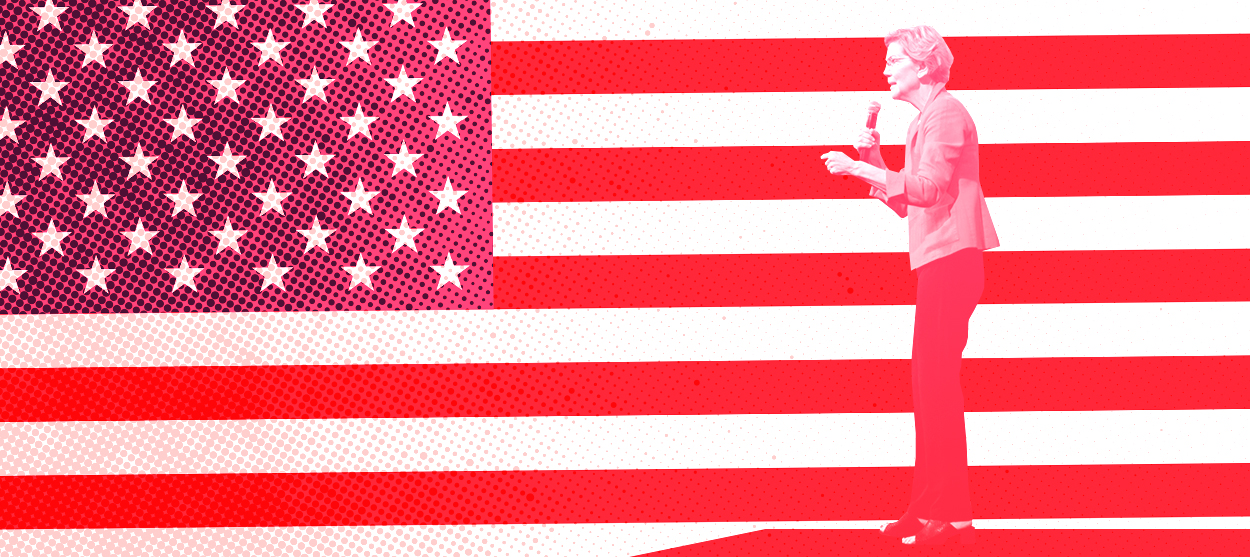No candidate is perfect. Only some are asked to be.
The difficult truth about Elizabeth Warren's presidential campaign


A free daily email with the biggest news stories of the day – and the best features from TheWeek.com
You are now subscribed
Your newsletter sign-up was successful
Politics is not a meritocracy. Of that we are reminded every time the president of the United States opens his mouth or Twitter feed.
But, dammit, Elizabeth Warren is brilliant. She is strategic and tough. One can envision her stepping smartly into a crisis. One can picture her signing a landmark bill.
Early this week, Warren presented a series of steps the government should take right now to protect Americans and the economy from the impact of the coronavirus. True to form, her blueprint looks out for uninsured Americans and low-wage workers who don't get paid sick leave. Though little noticed, it was a take-charge, presidential kind of move.
The Week
Escape your echo chamber. Get the facts behind the news, plus analysis from multiple perspectives.

Sign up for The Week's Free Newsletters
From our morning news briefing to a weekly Good News Newsletter, get the best of The Week delivered directly to your inbox.
From our morning news briefing to a weekly Good News Newsletter, get the best of The Week delivered directly to your inbox.
But Warren will not be the nation's next president. She is done, dispatched to the realm of the "coveted endorsement," following the trail of Senators Kamala Harris, Amy Klobuchar, and Kirsten Gillibrand — all candidates of significance who somehow never managed to convince Democratic primary voters that they were capable of defeating Donald Trump.
And, of course, all women. Searching for consolation in the wake of Warren's exit, commentators touted the record number of women running — and winning — congressional and state and local offices since Trump took office. But the presidency, it seems, is still a reach too far.
For a brief, shining moment in the shuffle of Democratic contenders, Warren was on fire. Tens of thousands of supporters attended her events last fall. People waited in line for hours to snap selfies with her. For a different — read, male — candidate, these rallies may have been interpreted as the makings of a movement. With Warren, they were framed as interesting distractions.
In the days before the Iowa caucuses in early February, observers applauded Warren's campaign organization and ground game. As always, she had done the work. "Iowa tends to reward those with superior relationships on the ground," said the state's leading newspaper, the Des Moines Register.
A free daily email with the biggest news stories of the day – and the best features from TheWeek.com
But the voters of Iowa did not reward Warren's competence or superior relationships. Once the smoke had cleared from the Democratic Party's logistical dumpster fire, Warren was declared the third-place finisher, behind Pete Buttigieg and Bernie Sanders. She never regained her footing.
People found all kinds of reasons to desert her. They said she waffled too long on health care, then they criticized her support of Medicare-for-all. They excoriated her for treading on Sanders' presumed turf, as though a leading Democratic senator — whose accomplishments include the creation of the Consumer Financial Protection Bureau — should meekly yield to the self-identified democratic socialist with the thin resume.
Warren's once-cool plans were suddenly dismissed as wonkish and pretentious. The woman who spent a lifetime standing up for low-wage workers and middle-class Americans was framed as a candidate with limited appeal beyond affluent and college-educated voters. She was shrill, condescending, not likable.
Mostly, it was nonsense. Warren wasn't a perfect candidate, but she had the makings of a great president. She brought passion, energy and ideas. Her talk about taking on a rigged system and creating a fair deal for all Americans wasn't campaign rhetoric; it was her life's work.
Somewhere along the way a narrative took hold that Warren was unelectable, that she, like Hillary Clinton, would fall to Trump. The New York Times and Siena College in November published unsettling polling results showing Warren trailing Trump with registered voters in several battleground states.
But which came first, the numbers or the narrative? One wonders what that survey would have looked like if would-be voters had been willing to accord Warren the same tolerance they showed Sanders, who still is unable to pin down the cost of his health care plan. Or the willingness they are now showing to overlook Joe Biden's missteps. Perfection, it would appear, is required only of the women.
Indefatigable on the campaign trail, Warren allowed herself a small break of composure Thursday when she talked about the women and girls who had cheered her failed bid to be president.
"One of the hardest parts of this," she said, her voice shaking just a bit, "is all those little girls who are going to have to wait four more years."
The even harder truth is that four years may not be enough.
Want more essential commentary and analysis like this delivered straight to your inbox? Sign up for The Week's "Today's best articles" newsletter here.
Barbara Shelly is a freelance writer who lives in Kansas City, Missouri. She wrote opinion pieces for The Kansas City Star throughout the second half of the George W. Bush presidency and all of the Obama years, and specializes in topics related to education, health care, and state legislatures. She is an Education Writers Association fellow and contributor to Kansas City's NPR affiliate and other regional and national publications.
-
 Film reviews: ‘Send Help’ and ‘Private Life’
Film reviews: ‘Send Help’ and ‘Private Life’Feature An office doormat is stranded alone with her awful boss and a frazzled therapist turns amateur murder investigator
-
 Movies to watch in February
Movies to watch in Februarythe week recommends Time travelers, multiverse hoppers and an Iraqi parable highlight this month’s offerings during the depths of winter
-
 ICE’s facial scanning is the tip of the surveillance iceberg
ICE’s facial scanning is the tip of the surveillance icebergIN THE SPOTLIGHT Federal troops are increasingly turning to high-tech tracking tools that push the boundaries of personal privacy
-
 The billionaires’ wealth tax: a catastrophe for California?
The billionaires’ wealth tax: a catastrophe for California?Talking Point Peter Thiel and Larry Page preparing to change state residency
-
 Bari Weiss’ ‘60 Minutes’ scandal is about more than one report
Bari Weiss’ ‘60 Minutes’ scandal is about more than one reportIN THE SPOTLIGHT By blocking an approved segment on a controversial prison holding US deportees in El Salvador, the editor-in-chief of CBS News has become the main story
-
 Has Zohran Mamdani shown the Democrats how to win again?
Has Zohran Mamdani shown the Democrats how to win again?Today’s Big Question New York City mayoral election touted as victory for left-wing populists but moderate centrist wins elsewhere present more complex path for Democratic Party
-
 Millions turn out for anti-Trump ‘No Kings’ rallies
Millions turn out for anti-Trump ‘No Kings’ ralliesSpeed Read An estimated 7 million people participated, 2 million more than at the first ‘No Kings’ protest in June
-
 Ghislaine Maxwell: angling for a Trump pardon
Ghislaine Maxwell: angling for a Trump pardonTalking Point Convicted sex trafficker's testimony could shed new light on president's links to Jeffrey Epstein
-
 The last words and final moments of 40 presidents
The last words and final moments of 40 presidentsThe Explainer Some are eloquent quotes worthy of the holders of the highest office in the nation, and others... aren't
-
 The JFK files: the truth at last?
The JFK files: the truth at last?In The Spotlight More than 64,000 previously classified documents relating the 1963 assassination of John F. Kennedy have been released by the Trump administration
-
 'Seriously, not literally': how should the world take Donald Trump?
'Seriously, not literally': how should the world take Donald Trump?Today's big question White House rhetoric and reality look likely to become increasingly blurred
